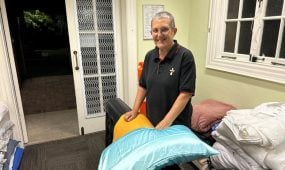Media guidelines for youth reporting
Justice & Advocacy
“Constant negative commentary directed at young people can have a significant impact on how the community views young people and matters relating to youth offending, and their willingness to support and engage with young people who’ve experienced tough times,” says Leanne Wood from Anglicare Southern Queensland

Media play an important role in influencing how safe people feel and how they respond to others in their communities.
Constant negative commentary directed at young people can have a significant impact on how the community views young people and matters relating to youth offending, and their willingness to support and engage with young people who’ve experienced tough times.
Discussions with young people
Anglicare Southern Queensland is proposing a set of guidelines for media outlets to follow when reporting on stories relating to youth-related matters. These guidelines emerged from discussions between young people from our youth homelessness and youth justice programs; our front line teams; Anglicare’s Research, Evaluation and Advocacy team; academic Associate Professor Renee Zanhow; and media professional Barbara Haines, from BBS Communications Group.
The young people’s comments reflected their views of media reporting as often telling one part of the story, and repeating stories and commentary over and over. Some of their comments included:
- “The media depict us as ‘malicious,’ ‘evil’ and label us negatively. They turn it into a story and think that’s all we’ll ever be.”
- “Not accurate depictions of situations.”
- “Make sure that they don’t keep saying “this happened again.” Focus on fixing and not blaming.”
What are the youth media guidelines?
Anglicare Southern Queensland propose that the seven guidelines (below) be considered by media outlets when reporting on matters relating to young people and youth offending:
- Persistently negative stories about young people stereotype everyone’s children and shape a public discourse that diminishes all young people. Positive stories are needed to provide essential balance.
- Journalists aim to be objective in their reporting. This is especially important when reporting alleged youth offences. Negative and sensational language (including headlines) relating to alleged youth offending damages the young people involves, their families and our communities.
- Stories and images that are sourced from social media must be checked for accuracy.
- Updated stories should be clearly identified as such. Stories that are constantly repeated with minor changes imply that young people are committing more crime than they are.
- Statistics are powerful. Ethical use of statistics tells the complete story and does not seek to manipulate or mislead.
- Children and young people should not be identifiable in text or images when reporting alleged offending. This includes their names, faces, families, clothes or other recognisable features.
- Publications and media organisations should be held accountable when they consistently breach these guidelines.
Negative impacts on young people
Constant negative messages in the media position young people as outsiders in their own communities. Research shows that experience of being an ‘outcast’ is deeply harmful, particularly for teenagers, and young people are more likely to experience mental health concerns, disengage at school, partake in risky behaviours and experiment with substance use/abuse.
“Facebook vigilantism”
Facebook can contribute to that experience of alienation. ‘Facebook vigilantism’ names and shames young people, whether they’re to blame for alleged crimes or not. When this occurs, everyday community members upload images of young people who appear suspicious to their Facebook pages and community groups. This often results in toxic commentary about young people that dis-empowers them when they can’t share their side of the story. These stories and images, often, get picked up by the mainstream media, and continue a cycle that silences and stigmatises young people.
Changing the narrative around youth in the media
By changing the narrative about youth in the media, and in the community, we can work towards balance and fairness in reporting on youth-related matters. To give one of our young people from our youth justice program the last word:
Stop all the hating and try and spread positivity.
To learn more about Anglicare Southern Queensland’s research, evaluation and advocacy projects, please visit the Anglicare Southern Queensland website.
First published on the Anglicare Southern Queensland website on 16 August 2024.
Editor’s notes: Read Anglicare Southern Queensland’s May 2024 submission to the Community Safety and Legal Affairs Committee regarding the Queensland Community Safety Bill 2024.
At the 2024 ACSQ Synod, a related motion was carried that “Encourages:
- a) individuals and ACSQ parishes and agencies to:
- (i) be aware of negative and inflammatory reporting about children and young people and help to raise awareness of others in this regard;
- (ii) explore actions they can take locally to encourage positive initiatives with and for children and young people, including those at risk and suffering disadvantage.
- b) the Queensland Government to re-commit itself to the development of evidence-based policy, including effective prevention, early intervention strategies, and work with families, that supports the social inclusion of young people and their pathways into fulfilling and productive lives.”






